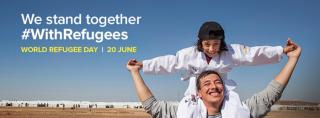World Refugee Day, 2016
By Bruce Knotts

As we celebrate World Refugee Day, let us remember that all of our peoples migrated from somewhere else. Even indigenous peoples have migrated. Migration is always difficult, but perhaps it is harder now than it’s been for a long time. There are some 65 million people who are displaced. I was the U.S. Government’s Regional Refugee Coordinator for West Africa 2000-2003. During that time I repeatedly visited refugees in camps, cities and towns all over West Africa. The first myth that gets exploded is that refugees are different from the rest of us. They are students, business people, professional people, property owners, farmers, academics and people just like the rest of us. Assistant Secretary of State for Populations, Refugees and Migration, Donald Steinberg went with me to see refugees in Conakry, Guinea. He introduced himself to a young refugee from Sierra Leone who said, “I had a science teacher by the name of Donald Steinberg.” That surprised the Assistant Secretary of State, who hadn’t thought about refugees as students of science. In fact, I once met a refugee who’d studied at the Paris-Sorbonne University. These are people just like us who never contemplated they’d lose their homes and have to move someplace else. Like it or not, it could happen to you, and it’s more likely than you think. Here in New York City, there are still people who are coping with the loss of their homes due to Hurricane Sandy in 2012. Others have had to leave New York City due to the high cost of living and jobs that don’t pay the rent. Conflict, war, climate change, economic collapse, bigotry, oppression and more cause individuals, couples and families to flee looking for a better life. Often, adults, who might be willing to stick it out a bit longer, will leave when they see their children have no future where they are. Many families move to ensure their children can have a better future. These people who are just like us and could be us one day, need welcoming communities that will help them start their lives anew. Canada, Germany, Turkey and Jordan stand out in the current crisis of Syrian refugees. The fact of the matter is that while caring for recently arrived refugees can seem like a burden, in the long run these refugees can become the promise of the nation’s future. Our faith and common humanity and our self-interest call on us to give refugees and the displaced the best welcome we can.